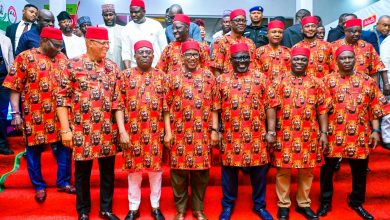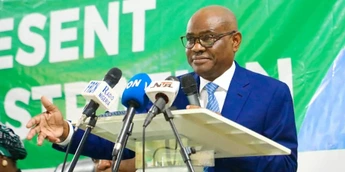EFCC: A Cacophony of Incompetent Circus

The ongoing court cases between the Economic Financial and Crimes Commission (EFCC) and former Kogi State helmsman, Yahaya Bello has brought bare the trite and ineptitude of the anti graft agency. Recent turn of events calls for thought-provoking reflection on the locomotion of it’s core mandate, it’s thrust and many failures. The case(s) of EFCC vs. Yahaya Bello are still in court; this author will rather steer clear of subjudice and dwell on the pertinent matter at hand, the commission.
Nigerians are of the opinion that EFCC is an instrument of selective justice for those in power to stiffen opposition and dissenting voices. Why the heat and attention to Yahaya Bello? Why GYB, considering the fact that from May 29th 2023 over eighteen former governors have had their immunity clause (Section 308 of the 1999 Constitution) expired, with the exception of Yahaya Bello and Darius Ishaku.
There’s no public mention, inquiry or arrest of the other former helmsmen and even such development came to fruition, it was done under the radar. It’s not that Yahaya Bello should not be prosecuted, but the dirty antics employed by EFCC can only be likened to persecution.
While corruption remains a cancer that eats our society, EFCC’s posture has been mundane and non-deterring because of their disorganization in convicting cases in courts.
It’s no surprise that the Supreme Court has scheduled October 22 to hear a suit filed by 16 state governments challenging the legality of the Economic and Financial Crimes Commission.
The suit, instituted by the Kogi State government and 15 other states, is contesting the constitutionality of the laws establishing the EFCC. A seven-man panel of Justices, led by Justice Uwani Abba-Aji, fixed October 22 for hearing after the states were joined as co-plaintiffs and leave granted for consolidation of the case in the suit originally filed by the Kogi State government through its Attorney General.
Exposed!! Popular Abuja doctor revealed how men can naturally and permanently cure poor erection, quick ejaculation, small and shameful manhood without side effects. Even if you are hypertensive or diabetic . Stop the use of hard drugs for sex!! It kills!
The fifteen other states joined in the suit, marked: SC/CV/178/2023, are Ondo, Edo, Oyo, Ogun, Nasarawa, Kebbi, Katsina, Sokoto, Jigawa, Enugu, Benue, Anambra, Plateau, Cross-River and Niger.
The EFCC is saddled with the responsibilities for fighting financial crimes in our dear nation Nigeria; the commission has perfected the act of botching cases (intentionally or otherwise). EFCC is in the habit of snatching defeat from the jaws of victory in court.
From 1999 till date, it’s only two former governors that the EFCC have successfully won their case and gotten the former helmsmen sentenced, whereas we have had over one hundred and forty ex governors. Accordingly, from 2003 when EFCC was formed till date public servants, politicians and others have siphoned billions of Naira with the EFCC having little to show for their fight against corruption.
They have become like some lame ducks. The kernel of this lucid treatise is not hinged on antagonizing the EFCC, as they have blamed the judiciary, lawyers and the alleged criminals as their alibis for failing to win cases. Typically a bad workman always blames his tools. Nigeria is ranked 145th out of 180 Countries in the Transparency International’s Corruption index in 2023,
Furthermore, the EFCC have been provided all that is requires in financial, technology, legal and human resources-wise, yet they keep falling short of their mandate.
In addition, the EFCC needs to be reorganized and streamlined; their chairperson’s have a history of loud innuendoes without evidence or follow-ups. In 2007 the then chairman of EFCC, Nuhu Ribadu accused Bola Tinubu of sleaze, he said “Asiwaju Bola Ahmed Tinubu would not escape justice, but would be made to face the full wrath of the law”, today the same Ribadu is working with the person he accused much earlier.
In 2015, the then chairperson of EFCC, late Ibrahim Lamurde also boasted that ‘No hiding place for former governors and ministers in the drive against graft’, Mr Lamurde finished his tenure without any high profile conviction.
The current chairman came in the fore riding like a Wild West Gunslinger entering a Moonshine Saloon eager for a gun duel with Yahaya Bello as his target. The chairman, Olanipekun Olukayode alleged that Yahaya Bello was evading EFCC’s invitation. On 20th September 2024 when GYB submitted himself to the Commission’s Headquarters, the chairperson was nowhere to be found.
The tragedy was after Bello’s departure, the commission issued a presser that GYB was not in their custody, and then followed that up by sending their operatives to forcefully invade Kogi State Liaison Office to arrest the former governor. It controverts logical deduction that someone willingly submits himself; the commission let him go out to turn around guns blazing trying to aprehend him.
The standard MO of EFCC leaves little to be desired. The Commission has derailed from the designated process, which is to investigate, charge to court and prosecute while the onus of adjudication and verdict pronouncement lies with the judiciary.
Instead the commission makes an overzealous spectacle though which before an arrest is made, a press conference is organised and journalists are fed with half-baked findings, the accused name shamed and pronounced guilty. In the courtroom, EFCC counsel have been found guilty of failure to file processes, absent during sitting, improper charges (in some cases up to 50 Counts charges) and other legal mishaps.
While we yearn for a country with minimal corruption, there is no collective anathema for the commission, but EFCC’s operation playbook is defective and incapable of stemming financial crimes. As Albert Einstein said ‘Insanity is repeating the same thing and expecting a different result’, the EFCC needs to change it professionalism approach.
Mohammed Halilu is a Policy Analyst based in FCT, Abuja…..




